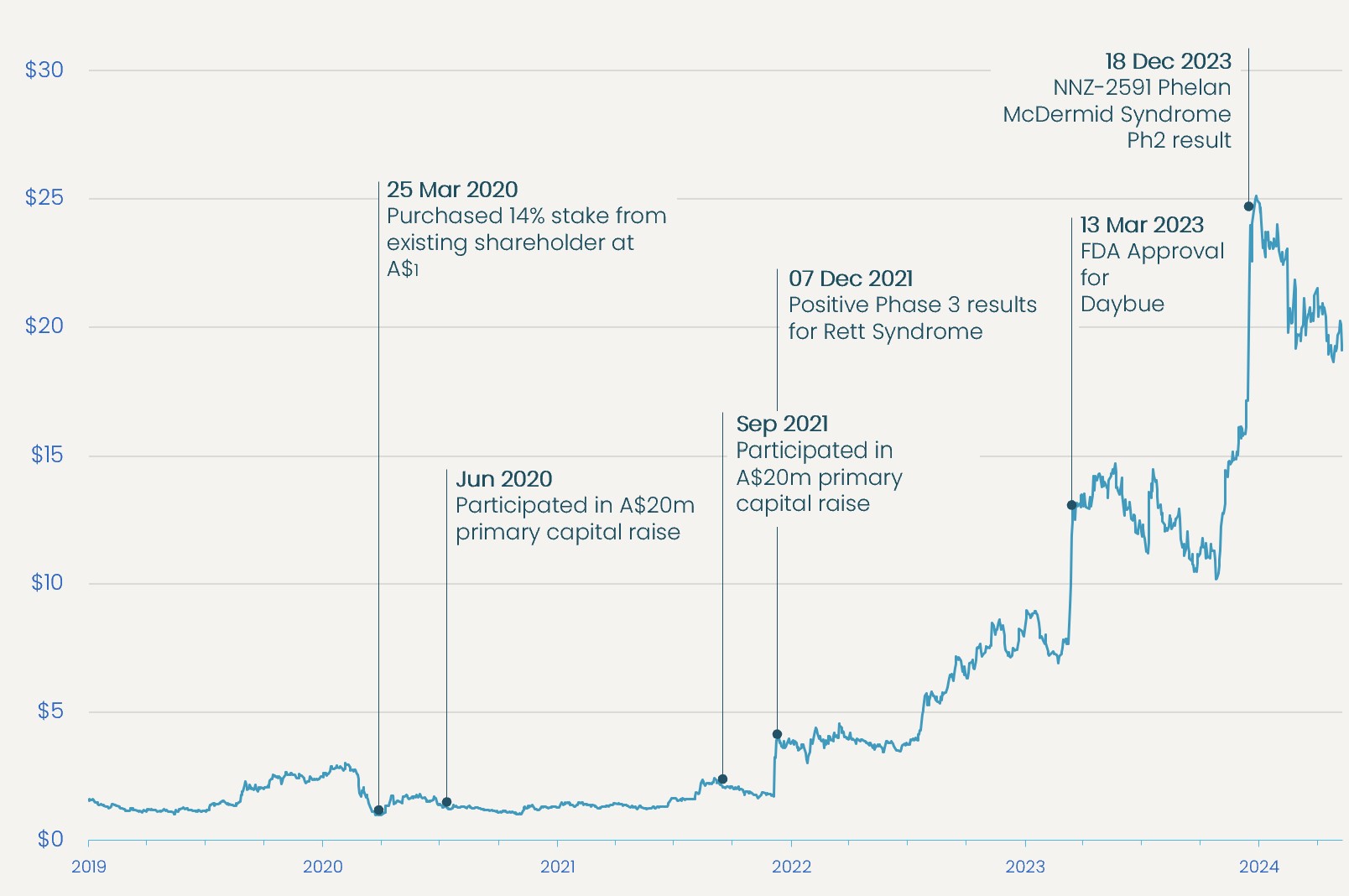Be greedy when others are fearful: Why now is the time to invest in healthcare
In the United States, healthcare now represents ~17% of its GDP and is projected to outpace the growth of the overall economy. In Australia, the federal and states governments have identified healthcare innovation as a key pillar in ‘knowledge economy’ of tomorrow. Remarkably, the number of companies operating within this sector more than doubled from 2017 to 2022. Investors aiming to develop portfolios that reflects the dynamics of the broader economy cannot afford to overlook the healthcare sector.
Chart 1: Innovative healthcare companies have more than double from 2017.
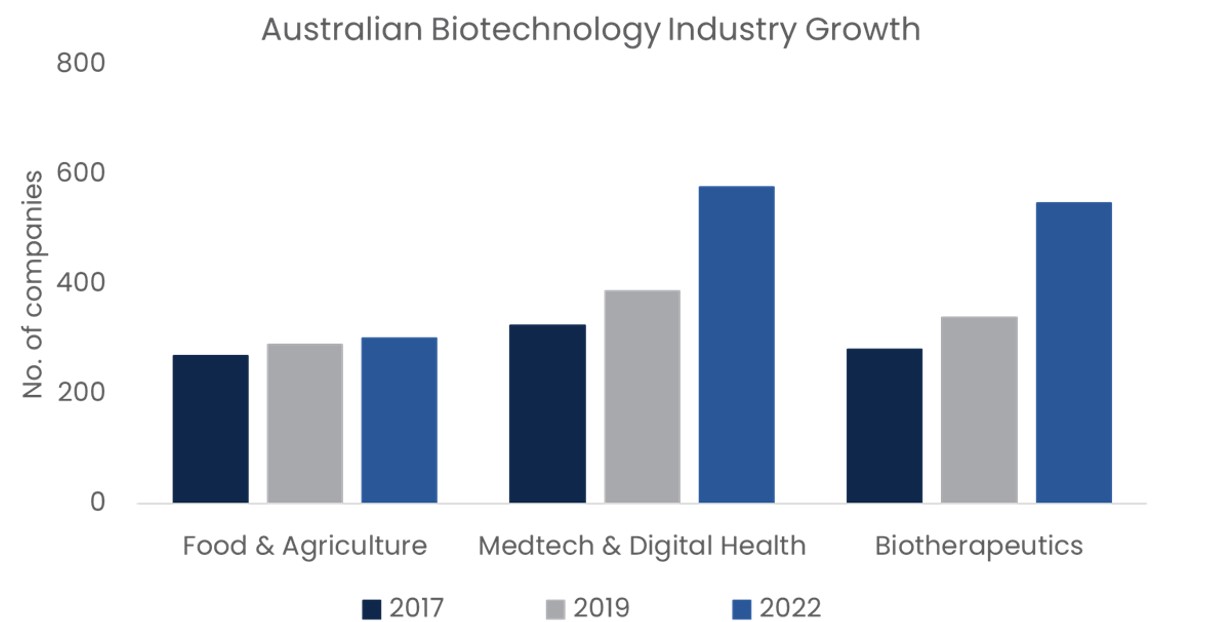
The return profile of innovative healthcare companies are very attractive with few parallels. Neuren has increased ~20x in the last 3 years, Telix ~23x since IPO and CSL has increased over ~350x since IPO. Unlike technology and other high-growth sectors, healthcare companies are relatively insulated from macroeconomic and business model risks. However, given the clinical and regulatory risks at play, this sector is not for the ill-prepared. For investors equipped with the appropriate knowledge, skillset, and network, venturing into innovative healthcare companies at the R&D stage isn't just promising—it's a pathway to potentially extraordinary returns. Investing in this sector offers the potential for transformative wealth creation and the opportunity to support ground-breaking advancements in human health.
In this wire, we explore why now is the best time we have seen for investors to enhance their exposure to the healthcare sector.
Why now?
In the words of the great Warren Buffett, “Be fearful when others are greedy and greedy when others are fearful." We believe this quote is very relevant to what we are seeking with today’s healthcare market dynamics. In the bull market of 2020 and 2021, healthcare company valuations experienced unprecedent growth. Both private and public fundraising were hitting records, and the IPO market was roaring. This period also saw many companies of questionable legitimacy able to raise vast sums of capital in the private and public markets. Fast forward to today, the market landscape has dramatically shifted. Valuations have crashed and even the most fundamentally sound companies struggle to raise cash at very modest valuations.
This brings us to a critical question for investors: When is the optimal time to invest in healthcare – during the frenzy of 2021 or now, amid more subdued market conditions? If your instinct is to invest now, reflect on whether your actions align with this belief. Have you inadvertently reduced your allocation to healthcare investments, increased your allocation to cash instead? Such a shift would diverge from the classic investment wisdom of buying low and selling high.
At KP Rx, while launching our Healthcare Opportunities Fund, we engaged with hundreds of stakeholders, ranging from institutional investors and family offices (FOs) to wealth advisors and high net worth (HNW) individuals across Australia and beyond. It became apparent to us that although many profess a strategy of 'buy low and sell high,' few genuinely practice it. Instead, the prevailing trend is to buy at high prices with the hope of selling even higher.
The current downturn in valuations of healthcare companies is deep and prolonged. Similar to what we have seen in the tech sector, the large cap profitable healthcare companies have largely remained unscathed (or have even thrived), whereas smaller or R&D stage companies have experienced substantial drawdowns.
Chart 2: The XBI index remains ~50% below its 2021 high.
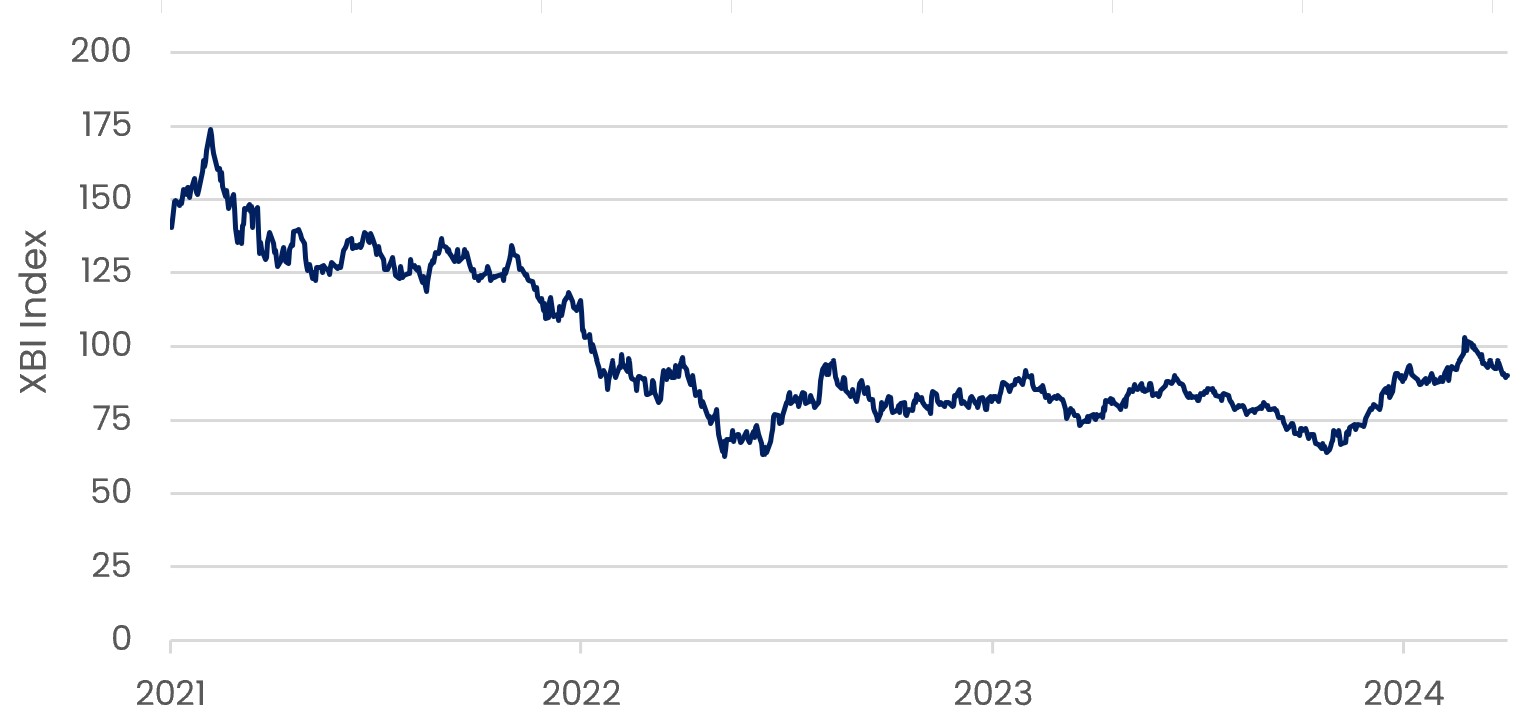
Chart 3: The valuations of earlier stage companies have suffered while later stage companies have been largely unaffected.
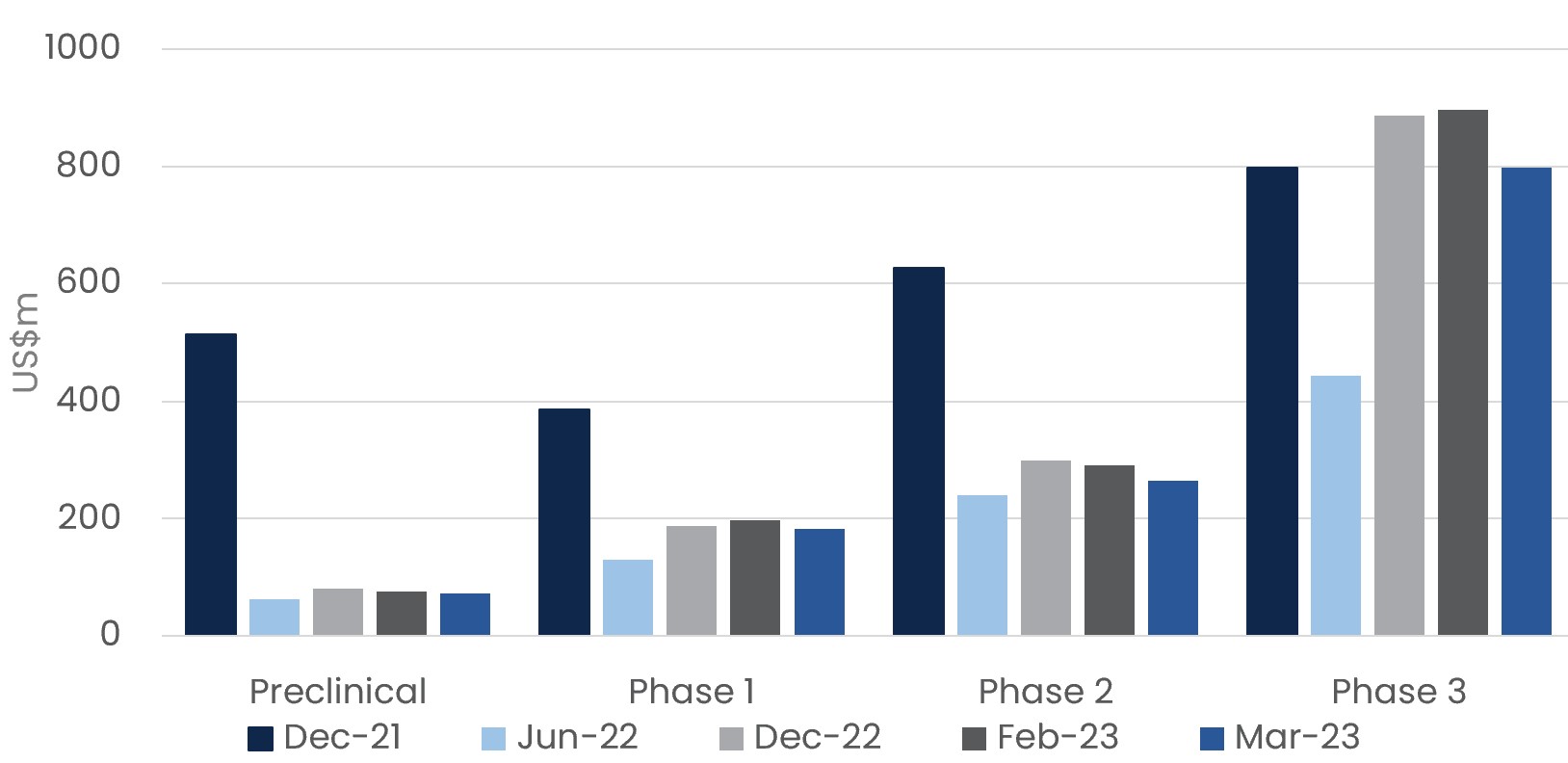
The Australian private healthcare capital raising market has been bleakly described to us as a ‘nuclear winter’ by market participants. Generalist investors including funds and HNWs/FOs that were investing heavily in 2021 have since largely retreated, while specialist healthcare investors who invest in private companies in Australia tend to focus predominantly on very early-stage companies. This shift has created significant challenges for Phase 2 biotech companies and those in early commercialisation stages in medtech, as raising private capital has become exceedingly difficult. Moreover, the option of going public to raise capital is just as difficult. The IPO window is virtually closed, with 2023 marking the slowest year in at least the last decade for healthcare IPOs on the ASX.
Chart 4: Healthcare IPOs and secondaries on the ASX.
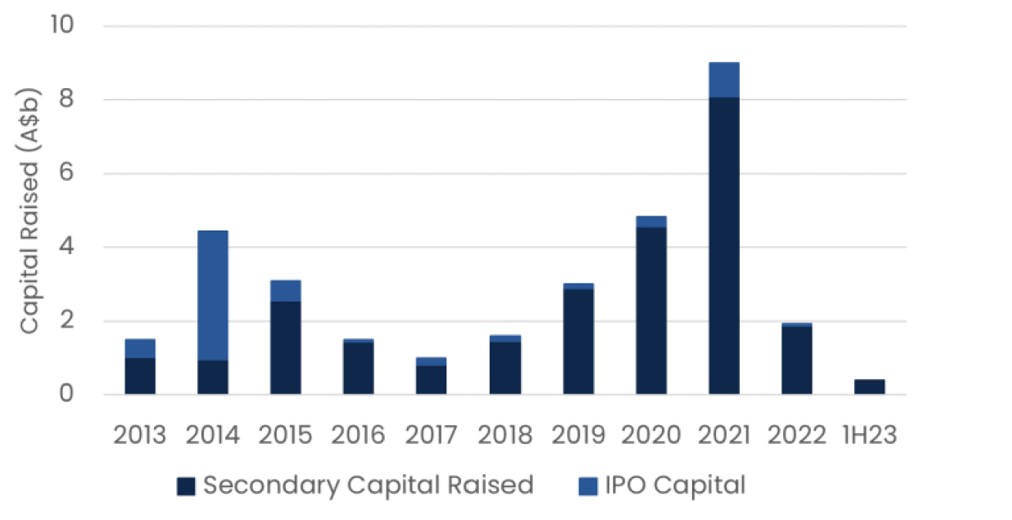
With this backdrop, the current market conditions are the best we have seen to invest into healthcare in Australia, particularly into private companies. The environment today allows us to discover companies with promising technologies or assets and invest at highly attractive valuations. This unique market scenario offers an exceptional chance to secure significant investments in promising healthcare ventures at advantageous terms.
Exiting these positions
The natural question to arise is whether the market needs to recover for a healthcare investor like KP Rx to generate attractive returns or to exit private positions. The answer is a definitive no.
Unlike with other sectors, the ultimate risk for a healthcare company is idiosyncratic. Success or failure in this sector is determined by the actions of the company and clinical trial results rather than larger macroeconomic factors.
Take, for example, the companies Neuren and Telix, which have seen their share prices surge ~20-fold and 15-fold, respectively, despite one of the most severe and extended downturn in modern healthcare market history. This significant appreciation occurred as both Neuren and Telix received U.S. FDA approval for their products, launched them, and are now generating hundreds of millions of dollars in revenue. Unlike other sectors, the demand and pricing for these products remain largely unaffected by economic conditions. In addition, within healthcare, the pricing, margins and competitive landscape are highly forecastable while a company is still in the R&D phase, which is not typically the case in other high growth sectors like technology.
Consider as a contrast, Uber, a dominant player in its sector, available in most major markets in the world, and has only very recently become profitable. In technology and other sectors, it is extremely difficult to forecast the business model, competitive landscape, and consumer pricing with a high degree of confidence, especially when the product is still in development phase. It is also difficult to forecast what consumers will be willing to pay in the context of the competitive landscape (i.e., there are now numerous options for Uber-like services for customers) and the bargaining power of the suppliers (i.e., now numerous options for Uber-like services for drivers). Often these products are not protected by patents or any substantial barriers to entry. The same is true for other household names such as Netflix, X (Twitter) etc.
This is not the case in healthcare. For instance, healthcare products destined for specific patient groups during clinical trials have well-defined buyers, payors (such as insurers and governments), and pricing can be accurately estimated based on existing drugs or treatments. Moreover, direct competitors are prohibited due to patent protection and other potential new treatments take many years to develop and can be monitored closely during this time (i.e., no new drug or device can launch without many years of clinical trials, publications, presentations at conferences etc.). The margins are readily forecastable from comparable companies manufacturing similar drugs or device. Thus, developing a successful drug or device is a forecastable and highly profitable business model. The key risk is clinical development risk.
Highlighting Neuren as an illustrative case: we invested in Neuren at an ~A$70m market cap or A$1 per share in CY20. In CY23, following FDA approval in April of that year, Neuren made ~A$220m in cash receipts of which A$184m fell to the bottom line within just three quarters. This figure represents around three times our entry valuation in cashflow in just the 3 quarters following FDA approval of their drug. This is not revenue, this is cashflow generated after expenses and available to shareholders. If the market had remained completely irrational and the share price was still A$1 today, we would be able to earn many multiples of our entry price per year in dividends.
Fortunately, Neuren’s share price did not stay at A$1 per share, it increased ~20x, even as healthcare indices fell ~40% (e.g., XBI).
Chart 5: Neuren's stock price is driven by idiosyncratic events.
Summary
Private equity and venture capital investors discuss the ‘vintage’ of funds similar to wine buffs discussing their favourite drop. This is because the data has shown that one of the most important determinants of returns for a fund is the year the fund launches. As we stand at the crossroads of a major downturn in the healthcare investment landscape, now emerges as an unprecedented opportunity for discerning investors to capitalise on. The current conditions present a rare window in the Australian healthcare sector where valuations are low, competition is reduced, and the potential for high returns is significant. While the broader market may be hesitant, those who are strategic and forward-thinking are well-placed to reap significant benefits from the anticipated resurgence in healthcare, positioning themselves for a rewarding and prosperous future.
5 topics
5 stocks mentioned

